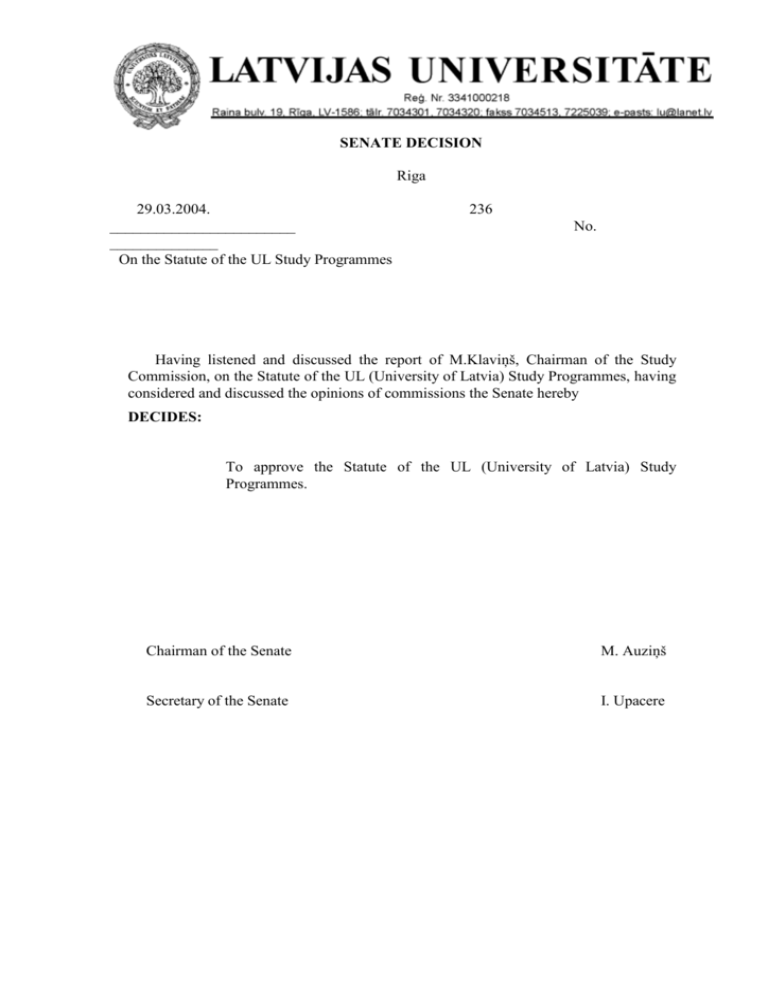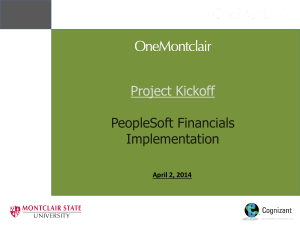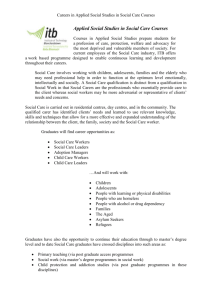The Statute of the Study Programmes
advertisement

SENATE DECISION Riga 29.03.2004. ________________________ ______________ On the Statute of the UL Study Programmes 236 No. Having listened and discussed the report of M.Klaviņš, Chairman of the Study Commission, on the Statute of the UL (University of Latvia) Study Programmes, having considered and discussed the opinions of commissions the Senate hereby DECIDES: To approve the Statute of the UL (University of Latvia) Study Programmes. Chairman of the Senate M. Auziņš Secretary of the Senate I. Upacere APPROVED at the Senate meeting of 9.03.2004 Decision No. 236 THE STATUTE OF THE STUDY PROGRAMMES OF THE UNIVERSITY OF LATVIA The statute is developed in accordance with the laws of the Republic of Latvia1 and UL Constitution (Satversme), fully respecting requirements of the national standard of higher education2 and other instruments regulating higher education in Latvia and in line with the fundamental guidelines of the Bologna Declaration3 and Lisbon Convention4. The Statute establishes basic principles of programme structure, content and programme management in Bachelor (Bakalaurs) and Master (Maģistrs) academic and professional studies. Study programmes to obtain qualification in regulated professions are harmonised with the requirements of the relevant EU directives and applicable legislation of Latvia5. Doctoral6 and internship7 study programmes are regulated by specific statutes. 1. TERMINOLOGY 1.1. The Bachelor (Master) academic study programme defines the requirements to obtain the academic Bachelor (Master) degree. Implementation of the requirements of the study programme is confirmed by the relevant diploma recognised by the Republic of Latvia. The academic study programme is a system of study courses and modules to learn and acquire content and methodology relating to one or several branches of science. The University of Latvia awards the Bachelor (Master) degrees in a group of sciences (humanities, social, natural, education, health, environmental and engineering sciences). The Bachelor study programme includes all the 1 Law on Higher Education Establishments in the Republic of Latvia (LR), Law on Education in the Republic of Latvia. 2 Regulations of the Cabinet of Ministers (LR MK) No. 141 of 20.03.2001 „On the National Standard of the First Level Professional Higher Education”, LR MK Regulations No.481 of 20.11.2002 „ On the National Standard of the Second Level Professional Higher Education”, 03.01.2002. Regulations Nr.2 of 03.01.2002 „On the National Standard of the State Academic Education” 3 „The European Higher Education Area”, Joint declaration of the European Ministers of Education, Bologna 19.06.1999. 4 „Convention on the Recognition of Qualifications concerning Higher Education in the European Region”, Council of Europe, Lisbon, 11.04.1997. 5 LR law „On Regulated Professions and Recognition of Professional Qualification” 6 UL Senate decision No.169 of 26.05.2003 „On the Statute „Doctoral Studies in the University of Latvia”” 7 26.02.2001. LU Senate decision No.280 of 26.02.2001 “On the Internship Study Programme in the University of Latvia”. 2 necessary aspects enabling a student to continue studies in the Master course, the Master study programme – in a doctoral study course in the relevant branch or sub-branch of science. 1.2.Bachelor thesis8 – is a student’s research work, which demonstrates acquisition of theoretical and practical knowledge and methodological skills in a group of sciences or a science in the amount identified in the study programme. 1.3. Diploma paper9 – is a student’s research work, which demonstrates acquisition of theoretical and practical knowledge and methodological skills in the amount identified in the selected professional standard and study programme and shows the ability to obtain results with elements of practical application and derive independent conclusions. 1.4. Contact lesson10 is a form of direct intercourse between academic staff and a student implemented with the aim to reach the goals and objectives of a study programme in line with the study programme curriculum and it lasts 1 academic hour. 1.5. Credit point is the amount of studies accomplished during 40 academic hours, where contact lessons should not exceed half of the amount. 1 credit point (crp) corresponds to 1.5 ECTS credits. 1.6. Qualification paper9 – is a survey of data and their analysis accomplished by a student, which demonstrates acquisition of theoretical and practical knowledge and methodological skills in the amount identified in the selected professional standard and study programme. 1.7. Master thesis9– is a student’s research work, which demonstrates acquisition of theoretical and practical knowledge, methodological and organisational skills in a branch or subbranch of science in the amount identified in the study programme. The paper should prove the ability of the student to carry out research containing elements of innovation and practical application and to draft independent decisions. 1.8. Module – part of a study programme having common goals and objectives, uniting purposefully selected study courses and ensuring certain academic or professional orientation. Modules (at least 6 crp.) consist of separate study courses, each having the minimum of 2 crp. A student may study a complete module or its individual parts. The description of programmes forming modules and the procedure of studies is approved by the Council of Study Programmes. The description of modules is attached to the programme. A student receives a grade for separate study courses. There is no common grade for the whole module. 1.9. Part time studies13 – a type of studies where a student earns less than 40 crp in an academic year and studies less than 40 hours per week. 1.10. Full time studies14 – a type of studies corresponding to 40 crp. per academic year and 40 hours per week. UL Senate Decision No.162 of 28.04.2003. „Regulation on Final Tests at the University of Latvia” 9 UL Senate Decision No. 162 of 28.04.2003 „Regulation on Final Tests at the University of Latvia” 10 Law on Higher Education Establishments, Article 1. 7) 8 11 12 13 14 UL Senate Decision No. 162 of 28.04.2003 „Regulation on Final Tests at the University of Latvia” UL Senate Decision No. 162 of 28.04.2003 „Regulation on Final Tests at the University of Latvia” LR Law on Higher Education Establishments, Article 1. 9) LR Law on Higher Education Establishments, Article 1. 10) 3 1.11. Practice – mastering of skills and abilities according to the sequence and plan established in the programme. Such studies in the university are carried out under supervision of university staff, outside the university – under the guidance of an experienced specialist. 1.12. Professional higher education Bachelor (Master) study programme defines all the requirements to obtain the degree of a professional Bachelor (Master). The programme is a system of study courses and practical learning to acquire content, methodology and skills relating to one or several branches of science and sectors of economy. The Bachelor study programme includes all the necessary aspects enabling a student to continue studies in the Master course, the Master study programme – in a doctoral study course in the relevant branch or sub-branch of science. The award of the degree or qualification is confirmed by the relevant diploma recognised by the Republic of Latvia. The professional higher education Bachelor study programme includes the requirements of the 5th level professional qualification and corresponds to the standard of the specific profession. 1.13. Professional higher education study programme defines all the requirements to obtain the 4th or 5th level professional qualification. Study programme is a system of courses and practical training to ensure learning of knowledge and skills identified in the standard of corresponding profession. The student upon implementation of the requirements of the professional study programme is entitled to a diploma of the professional higher education or a diploma of the higher professional qualification. 1.14. Study course – a purposefully organised, systemic presentation of the subject of studies, the basic content or part of content of a branch or a sub-branch of science, technology or arts to reach certain educational objectives, master knowledge and skills on a certain level and over a certain period of time, usually during one or several semesters. The scope of the study course should correspond to at least 2 crp. 1.15. Study curriculum – arrangement of components of a study programme (study modules, study courses) in a logical sequence and timing in line with the goals of the study programme. 1.16. Study subject – a didactically justified system of knowledge, skills and attitudes developed in line with the requirements of a Bachelor, Master or professional study programme which corresponds to a specific branch or sub-branch of science. 1.17. Study programme15 includes all the requirements needed to obtain an academic degree or professional qualification. A study programme is regulated by a special document – description of study content and implementation, which: 1) defines the requirement of previous education; 2) in line with the level and type of education, identifies the goal, objectives and planned outcomes of implementation of a specific programme, content of the offered training, scope of the compulsory, compulsory elective and elective parts of the programme, timing of studies by elements of training, evaluation criteria of obtained education, forms and order of testing; 3) comprises lists of academic staff involved in the delivery of the programme, provides information on qualification and duties of academic staff. Implementation of the compulsory and compulsory elective parts of the academic should requires full time work of at least five professors and associated professors, except cases provided for in the second part of this article; 4) includes lists of structural units involved in implementation of the programme (departments, groups of professors, laboratories, institutes, etc), identifying their contribution in implementation of the specific programme; 5) comprises the profile of the necessary auxiliary personnel and identifies their respective duties; 6) contains the description of the material base needed for programme implementation; 15 LR Law on Higher Education Establishments, Article 55. 1. 4 7) estimates programme costs. 2. GENERAL PROVISIONS 2.1. The following study programmes are implemented at the University of Latvia: 2.1.1. Bachelor (Bakalaurs) study programmes (to obtain academic or professional Bachelor degree); 2.1.2. Master (Maģistrs) study programmes (to obtain academic or professional Master degree); 2.1.3. the first level professional study programmes, which include knowledge and skills needed to obtain the fourth level professional qualification; 2.1.4. second level professional study programmes, which include knowledge and skills needed to obtain the fifth level professional qualification. 2.2. The Professional Bachelor study programme ensures also acquisition of the fifth level professional qualification; the Professional Master Study Programme may foresee acquisition of the 5th level professional qualification. 2.3. Study programmes are developed by professors, associated professors, assistant professors, study programme councils and other academic bodies. Application for a study programme is submitted by the Council (Dome). The Senate establishes the procedure of approval of study programmes. 2.4. All study programmes after their approval by the Senate and receipt of the licence are included into the UL Study Programme Register and become the intellectual property of the University of Latvia. 2.5. The Study Programme Council is responsible for the content and quality of a study programme. 2.6. The Faculty (Department) and a study programme director approved by the Senate monitor implementation of a study programme and are responsible for the overall quality of studies. 3. BACHELOR STUDY PROGRAMMES 3.1. Bachelor studies ensure mastering of theoretical knowledge, research skills and aptitude in the respective branch, prepare a student for follow-up studies in higher level study programmes and for general employment in the relevant area. The Professional Bachelor study programme prepares a student for independent work in the chosen profession. 3.2. The scope of a study programme is 120 crp (full time studies in 3 years/6 semesters) or 160 crp in exceptional cases, which are decided by the Senate (full time studies implemented in 4 years/8 semesters). 3.3. The scope of the Professional Bachelor study programme is at least 160 crp. (full time studies implemented in 4 years/ 8 semesters). 3.4. The Bachelor study programme consists of : 1) compulsory part (Part A) – at least 60 crp (including Bachelor thesis); 2) compulsory elective part (Part B) – at least 40 crp; 3) free elective part (Part C ) – up to 10 crp. Content of studies is organised in modules or study courses. 3.5. Compulsory part (Part A ) – at least 60 crp. 3.5.1. The compulsory part consists of: 1) the University basic study module (at least 10 crp); 5 2) modules of the basic studies of the branch (at least 40 crp); 3) Bachelor thesis (10 crp). 3.5.2. University basic study module (at least 10 crp) 1) Goals – to expand academic outlook of a student, to provide basic knowledge of the contemporary development tendencies, problems and theories of science and their role in the society. 2) Content – the list of recommended UL basic study courses is approved by the pro-rector for academic work. Study Programmes Council then selects courses from this list. The planning of courses in a module by semesters is decided by the Study Programmes Council. 3) Outcomes – conceptual understanding by a student of importance of science in the development of knowledge society and on the role of the selected study field in the general scientific context. 3.5.3. Branch basic study modules (total scope – at least 40 crp). 1) Goals – to ensure acquisition of the basic knowledge and skills enabling a student to study a branch/field of science on a more advanced level. 2) Content – modules consist of study courses of the selected group of sciences or a science, inter-branch courses or study courses of the relevant methodology of the selected science. 3) Outcomes a) Minimum of knowledge and skills required by the content of the awarded degree, which enables a student to continue studies on the following study levels. b) The ability of conceptual analysis of phenomena and processes in a concrete field of science, skills of generalisation, ability to independently propose hypotheses and evaluate theories and problems of the respective branch in the general context of contemporary science. 3.5.4. Bachelor thesis – 10 crp. (in the Professional Bachelor study programme – a diploma paper – 12 crp.). The scope of the Bachelor thesis may include also the theoretical part of seminars. In addition, in the Professional Bachelor study programme, the compulsory part should also include a professional basic study module (26 – 40 crp), which comprises a compulsory period of practice (26 crp). 6 3.6. Compulsory elective part (Part B) The compulsory elective part consists of individual courses or modules for the total amount of at least 40 crp. (in multi-branch study programmes – at least 20 crp). 1) Goals – to deepen knowledge and skills in a certain branch/sub-branch of science or professional field of work. 2) Content – study courses of a branch/sub-branch of science. a) Content of modules and scope of studies is decided by the Study Programme Council (in accordance with the number of students in the programme), however, the minimum should not be less than – 10 – 20 crp. b) One module for 10 crp may be planned individually by a student. Modules may be taken from either the lists of modules approved by the UL belonging to the selected branch of science or any other science or from study programmes of other universities, with orientation to obtain special knowledge and skills necessary for the development of the Bachelor thesis or increase of competitiveness in the labour market. The selection of the module should be co-ordinated with the Study Programme Director. 3) Outcomes a) Specialisation of knowledge and skills in line with the requirements of the awarded degree and possibility to continue studies on the following study levels. b) Ability to solve problems and tasks of the selected branch/sub-branch of science and the related sciences in the relevant area of economy. c) Preparedness and ability to carry out certain specialised functions, which expand or specify the employment potential. 3.7. Free elective part (Part C ) – up to 10 crp. 1) Goals – to provide an insight into other branches and study fields, to provide the opportunity to acquire the necessary preliminary knowledge enabling to continue studies in the higher level programme of another branch. 2) Content – a student may plan the free elective part of studies from the UL approved study courses of other sciences or other modules. The list of selected courses is approved by the Study Programme Director. 3) Outcome – understanding of the development tendencies of other branches of science or fields of economy, which expands the employment potential. 3.8. If a student is willing to continue studies in a higher level study programme of another branch, then instead of the two individually selected study modules, a student should choose the basic study module referred to in point 6.1. 4. MASTER STUDY PROGRAMMES Master study programme is intended to train specialists with high qualification, ready to carry out independent work in the area of research, professional activities corresponding to the studied science (sub-branch), able to upgrade professional qualification and further specialise. 4.1. A Master study programme consists of a compulsory and a compulsory elective part. Studies in both parts are organised in the form of study modules or courses. The scope of studies is 80 crp, which in full time studies may be implemented in 4 semesters/2 years. Professional master studies after a student has received the Professional Bachelor degree may be realised for the amount of 40 crp. (2 semesters/1 years). In that case a student is not entitled to professional qualification. To obtain the professional qualification the scope of study programme is 80 crp. 7 4.2. Compulsory part (Part A ) – at least 36 crp (including Master thesis) 4.2.1. The compulsory part consists of : 1) Branch/sub-branch Master study modules (total at least 16 crp); 2) Master thesis (at least 20 crp). 4.2.2. Branch/sub-branch Master study modules (total at least 16 crp). 1) Goals – to teach the students the knowledge of the content, methodology, development trends, theories and application possibilities of a science or a subbranch of science. 2) Content – study courses and research work in a branch/sub-branch of science. 3) Outcomes a) The ability to analyse the on-going processes in the respective branch of science and select research approaches and methods, which correspond to the nature of theoretical question or empirical phenomena. b) The ability to present findings of research in the Master Thesis. c) Knowledge and skills ensuring the award of the Master degree in science and preparing for continuation of studies in a doctoral programme or professional area of work in the studied sector (sub-sector) of science. Understanding of basic principles of innovation and possibilities of knowledge commercialisation in the given sector. 4.2.3. Master thesis – 20 crp. Master thesis is a scientific work in the selected branch (sub-branch) of science presenting independent research of a student. The Professional Master study programme should comprise also practice for the amount of 6 crp. as an element of the compulsory part. 4.3. Compulsory elective part (Part B) – at least 30 crp. The elective part consists of courses and modules for the total amount of at least 30 crp. One module (group of course) is estimated as at least 15 crp, which offers a student a deeper specialisation in the sector or sub-sector of science. If the nature of the programme permits, it is possible to select one study module for the amount of up to 10 crp. from a Master programme of a related science, provided that this is co-ordinated with the Study Programme Director and the research supervisor of the Master thesis. A student may compose this study module also individually, selecting courses from the UL or other higher education establishment programmes, focusing on special knowledge and skills necessary for the development of Master thesis and increase of competitiveness in the labour market. The content of the module is approved by the Study Programme Director. 1) Goals – to provide a student with specific theoretical and empirical knowledge in the respective branch/sub-branch of science or relevant area of national economy. 2) Content – courses of branch/sub-branch of science approved (content and scope) by the Study Programme Council co-ordinating this decision with the respective academic unit working with the branch/sub-branch of science. 8 3) Outcomes a) Ability to carry out theoretical and applied research in the selected branch or sub-branch of science or area of national economy. b) Knowledge and skills needed for the award of the Master degree in science or professional field and allowing to specify the connection with the sub-branch as well as to continue in doctoral studies. c) Compliance with the higher level professional qualification requirements in the fields of national economy, education and administration. 5. PROFESSIONAL HIGHER EDUCATION STUDY PROGRAMMES Graduates of professional higher education study programmes do not receive Bachelor or Master degrees at the end of studies. The structure and content of these programmes are established in the National Professional Higher Education Standards. Studies are organised in modules or study courses. 6. ADMINISTRATION OF STUDY PROGRAMMES 6.1. To enable students select additional degree studies in another programme in parallel with the basic degree studies, each Study Programme Council should establish a basic study module in the branch as 20 crp., which gives the opportunity to study a study module and then continue studies in the respective Master programme. Study Programme Council may also put additional requirements to the studied courses in order to provide the graduates of these modules the opportunity to continue in the respective Master programme. Such requirements are approved by the Faculty Council (Dome) representing the relevant branch. 6.2. Academic commissions (within the framework of the scientific branch groups) in cooperation with the Deans of respective faculties and Study Programme Directors develop proposals on the structure of the general basic studies module. Proposals on the content of study courses forming the module are developed by Study Programme Councils in accordance with the general principles of organising Bachelor programme in the UL. 6.3. The relevant UL Academic Commissions develop recommendations on the general content of courses offered to students of other groups of science in accordance with the list of basic study courses approved by the Academic Pro-Rector in natural sciences, humanities or social sciences. The UL Academic Commissions also develop recommendations on staff and methods of teaching, however the decision on inclusion of the offered courses in study programmes is made by Study Programme Councils. 7. ON AMENDMENTS TO STUDY PROGRAMMES 7.1. A study programme is repeatedly approved and accredited at least once in 6 years. 7.2. Proposals to change a study programme may be submitted by the UL academic staff and students. These proposals are adopted by the Study Programme Council and approved by the Faculty Council (Dome). 7.3. If the total scope of the programme is increased or decreased by 40 crp., change of 45% in the compulsory part of the study programme is permitted, the reference level being the previously accredited programme. If the total amount in credit points of a study programme is not changed, modifications in the compulsory part of a study programme between two accreditations shall not exceed 30% from the scope of the compulsory part. 9 7.4. If in the period between two programme accreditations there is a necessity to update the study programme for more than 45% (30%) from the scope of the compulsory part, an extraordinary programme accreditation shall be required. 7.5. The range of modifications in the elective part of the programme is not regulated. 7.6. Study Programme Director shall inform the Academic Department on any change in study programme during a period of seven working days. 7.7. UL Senate passed the decision on approval, suspension or termination of programmes. 8. TRANSITION PROVISIONS 8.1. The Statute shall gain effect starting with the academic year 2004/2005. 8.2. The Statute shall not apply to those already accredited study programmes for which the accreditation period has not yet expired, except cases of permissible change of scope in between accreditations. Annex 1 – Sample of a modular structure of a study programme MASTER OF ENVIRONMENT MANAGEMENT Modular structure of the study programme The programme is modularly structured in line with the sequential cycle of environment management – starting with the study of problems of environment (cognition) in the complex system of interaction between the natural and social environments (Module I – Integrative Environmental Science) and development of selected problem solving policies and plans (Module II – Environmental Policy and Planning) and the respective programming of action (Module III – Theory and Management of Environmental Administration), and business administration of actions in sectors of environmental system (Module – Management of Nature Resources and Environmental Technologies). The first module ensures learning of the academic base of the programme (Part A) which is a foundation for all the further phases and sectors of environmental administration studies. The structure of every following module of the cycle is determined by the Part A basic course and the corresponding set of elective courses from the Part B. Four modules of the environmental management cycle in the programme are supplemented by two other modules: the introductory module on conceptual integration of environmental theory and practice (Paradigm of environmental science and administration) – for graduates of other programmes starting studies in this Master programme, and connected and target- oriented by the completing module – the Master academic thesis. The final module of studies, according to the requirement for inter-disciplinary approach to the academic research in the area of environmental management, is implemented simultaneously as an element that penetrates the whole process of Master studies (special seminars in the system analysis of environment and integrated research methodology of environment) and as a targeted and purposeful concentration of everything that has been studied in the whole process of the studies manifested as independent work of a student. Course title Cr edi t 1.s . 2.s . 3.s . 4.s . Test 10 poi nts Interdisciplinary Environment Cognition and Transformation 1. Paradigm of Environmental Science and Administration Module I. Integrative Environmental Science 2. Natural Sciences in Environmental Studies 3 Examina tion A 5 3. Economic and Administration Sciences in A Environmental Studies 4. Cultural Sciences in Environmental Studies A 4 5. Behavioural Sciences in Environmental Studies Strategic Environmental Management Module II. Environmental Policy and Planning 6. Environmental Policy and Sustainable Development 7. Environmental Planning and Development of Local Authorities 8. Environmental Information: Assessment and Management 9. Legal Protection of Environment 3 Examina tion Examina tion Examina tion Examina tion A 3 15 3 A 16 A 6 A 4 B 2 B 2 10. Public Involvement and Non-Governmental B Organisations 11. System Dynamics B 2 12. Demography and Environment B 2 13. Environmental Aesthetics B 2 14. Risk Analysis and Management B 4 Examina tion Examina tion Examina tion Examina tion Examina tion Examina tion Examina tion Examina tion Examina tion 2 10 Module III. Theory and Management of Environmental Administration 15. Systems of Environmental Administration A 4 16. Environment Assessment B 2 17. Management Theory B 2 18. Project Development and Management B 2 19. Clean Technologies and Production B 2 Examina tion Examina tion Examina tion Examina tion Examina tion 11 20. Environmental Communication B 2 21. Education for Sustainable Development B 2 22. Development and Administration of Eco- B Tourism 23. Business and Environment B 2 Environmental Business Administration Module IV. Management of Nature Resources and Environmental Technologies 24. Nature Resource Management A 4 6 4 25. Environmental Management: Energy Utilities and Protection of Air 26. Environmental Management: Waste Management 27. Environmental Management: Water Management 28. Environmental Management: Biological Diversity and Nature Conservation 29. Environmental Management: Integrated Coastal development 30. Environmental Management: Sustainable Communities Interdisciplinary research on environment management Module. Master Academic Thesis Special seminars: 31.Integrative Research Methodology of Environment (problem seminar) 32. Environmental System Analysis (interactive seminar) Independent Work: 33. Master Thesis B 2 B 2 B 2 B 2 B 2 B 2 Total in the programme A credit points B credit points Master thesis 80 36 14 A 30 A Examina tion Examina tion Examina tion Examina tion Examina tion Examina tion Examina tion Examina tion Examina tion Examina tion Examina tion 30 2 A A 2 2 Examina tion Examina tion 4 20 A 20 18 2 20 10 6 4 20 8 8 4 Defence 20 20 12







